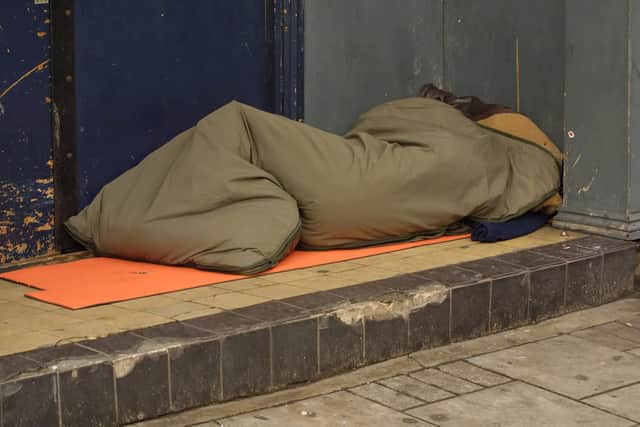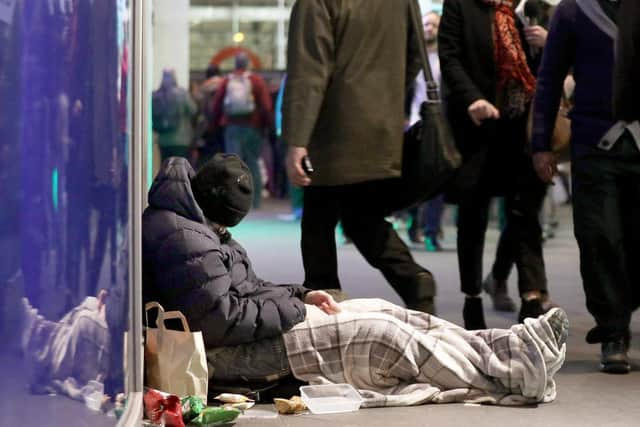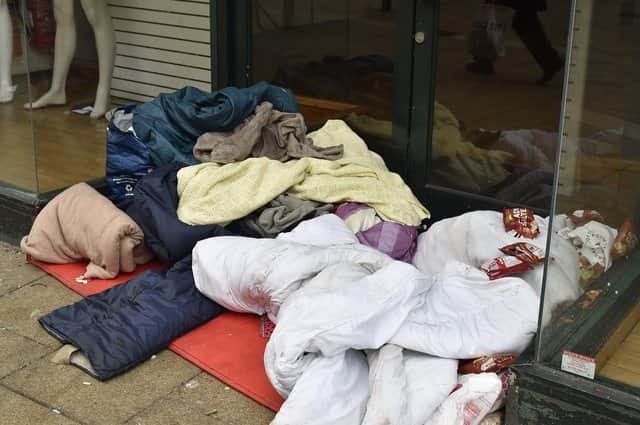‘We witness harm every day’ - Birmingham’s rough sleepers discuss the reality of life on city’s streets
This article contains affiliate links. We may earn a small commission on items purchased through this article, but that does not affect our editorial judgement.
and live on Freeview channel 276
Rough sleepers in Birmingham have revealed the stark reality of what it’s like to live on the streets as part of new research which aims to help tackle homelessness in the city.
The research has documented the vulnerability and incidents of exploitation that those living on the streets experience, by gathering first-hand accounts from some of the city’s rough sleepers.
Advertisement
Hide AdAdvertisement
Hide AdFindings in the report by Birmingham City University suggest that rough sleepers’ feelings of exclusion from society and their lack of trust in major institutions can perpetuate their situation.


What did the city’s rough sleepers say and what does the study show?
In total, five rough sleepers – three males and two females – agreed to be interviewed for the study, via one of the country’s biggest youth homelessness charities.
All were aged 18 to 30, had been on the streets for a period ranging from one and a half to six years and all were White, which at 84 per cent according to national data, is the most common ethnicity of rough sleepers in the UK.
Interviews were conducted with caseworkers present as safeguards and all respondents’ answers were anonymised.
Advertisement
Hide AdAdvertisement
Hide AdThe research team analysed data over several months and identified three key themes that spoke to specific aspects of vulnerability in rough sleepers: an erosion of trust in mainstream society and its functions; feelings of exclusion from society alongside a sense of community among their peers; and experience of varying degrees of exploitative behaviour.


“We witness harm every day’
It was found that negative attitudes towards rough sleepers, triggered by their appearance, behaviour, reputation or simply their street presence, left them feeling unaccepted and rejected.
This in turn eroded their trust in the general public and the state, including care services and law enforcement.
As one of the respondents, ‘Mull’, put it: “The police will treat you more like an offender than a victim because of your past…they’ll look at you and be like ‘well you’re the cause of the problem, jog on.’”
Advertisement
Hide AdAdvertisement
Hide AdFeelings of marginalisation and mistrust also led rough sleepers to turn to each other for comfort and security, forming relationships to cope with life on the streets, the study said.
“The homeless have a very strong communal bond with each other. It’s because the homeless can only support other homeless people”, explained another interviewee, ‘Kurt’.
These friendships made it easier and more desirable for them to continue sleeping rough instead of seeking housing, despite the associated discomfort, risks of violence and other forms of exploitation, which all participants were aware of and had experienced to varying degrees.
“We witness [harm], every type, every day,” as Kurt starkly put it.


Homeless women are ‘even more likely to experience violence and victimisation’
Advertisement
Hide AdAdvertisement
Hide AdThe authors also found that bonds formed among rough sleepers are particularly strong, being based on shared history and experience, which sometimes includes unhealthy behaviours such as drug and alcohol abuse.
This can create a mutual dependency but can also lead to exploitation from criminal gangs preying on the vulnerable and even among the homeless themselves.
Contributor Kurt spoke of his experiences of stealing and acting as a drug runner to sustain his addiction.
“The first [homeless] guy that I met in Birmingham used to make me shoplift”, he said. Homeless women are even more likely to experience violence and victimisation, as was the situation for “Jesse”, whose drug habit resulted in her turning to prostitution under the coercive control of a street sex trafficker.
Advertisement
Hide AdAdvertisement
Hide AdJesse is in a relationship with Kurt, and he helped her overcome her addiction.
She is now off the streets but at one point while she was rough sleeping and engaged in sex work, the only person she could rely on to sustain her was her abuser and so she was mired in a reproductive circle of suffering.
What’s been said about the study?
The academics behind the study hope that the revelations and recommendations will kickstart changes in policy and practice to better help those living on the street escape this pattern of mistreatment and manipulation.
Researcher Maram Abdulkader added: “What we have gleaned from our conversations with rough sleepers is that they are often caught in a vicious cycle of vulnerability and victimisation.
Advertisement
Hide AdAdvertisement
Hide Ad“Their exclusion from mainstream society contributes to a lack of trust in officialdom, leading them to develop a new sense of belonging among their own community. But this can also limit their mobility and even perpetuate their exploitation.
“What’s more, feelings of isolation, mistrust of authority and lack of faith in society and its rules results in the homeless often not reporting crimes against them. This is something we have to address.”
Direct testimonies from the university study form the basis of a newly published paper titled Living Rough, An exploratory study on the vulnerabilities of rough sleepers in Birmingham, United Kingdom.
The study says the following proposals can help to address the issues raised:
- an increase in multi-agency work between charities and other third sector groups
- more comprehensive analysis of homelessness data from government
- larger-scale academic investigation of the vulnerabilities of rough sleeping
- closer working with those who have experienced rough sleeping in further studies.
A message from the editor:
Advertisement
Hide AdAdvertisement
Hide AdThank you for reading. BirminghamWorld is Birmingham’s latest news website, championing everything that is great about our city - reporting on news, lifestyle and sport. Find out more about who’s who in the team, and our editorial values. We want to start a community among our readers, so please follow us on Facebook,Twitter and Instagram, and keep the conversation going
Comment Guidelines
National World encourages reader discussion on our stories. User feedback, insights and back-and-forth exchanges add a rich layer of context to reporting. Please review our Community Guidelines before commenting.
